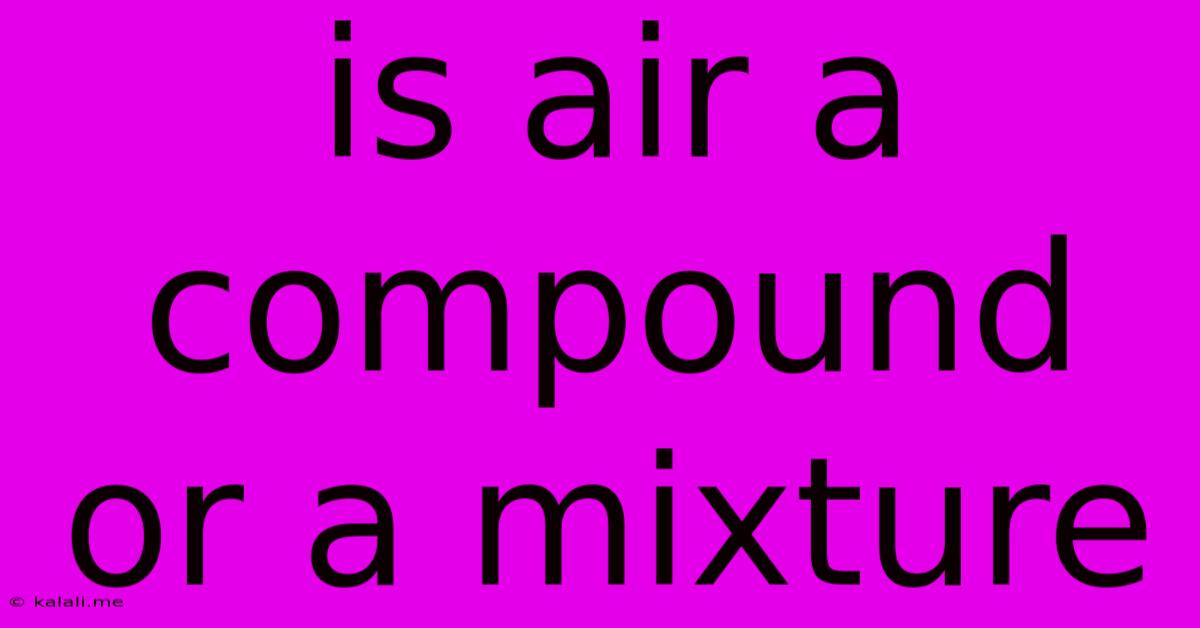Is Air A Compound Or A Mixture
Kalali
Jun 14, 2025 · 3 min read

Table of Contents
Is Air a Compound or a Mixture? Unpacking the Composition of Our Atmosphere
Air, the invisible substance we breathe every second, is often taken for granted. But what exactly is it? Is it a compound, a pure substance formed from chemically bonded elements, or a mixture, a physical combination of different substances? This article will delve into the composition of air and definitively answer this question, exploring its various components and their interactions.
Air is a mixture, not a compound. This is a fundamental distinction in chemistry. While compounds have a fixed ratio of elements chemically bonded together (like water, H₂O), mixtures have variable compositions. The relative proportions of the components in a mixture can change, and the components retain their individual chemical properties.
The Major Components of Air
Air's primary constituents are:
- Nitrogen (N₂): Making up approximately 78% of the atmosphere, nitrogen is a crucial element for life, though plants and animals can't use it directly in its gaseous form.
- Oxygen (O₂): Essential for respiration in most living organisms, oxygen accounts for roughly 21% of the atmosphere. Its presence is vital for combustion and many other chemical processes.
- Argon (Ar): This inert noble gas comprises about 0.93% of the atmosphere. Its chemical inactivity makes it useful in various industrial applications.
- Carbon Dioxide (CO₂): A trace gas, carbon dioxide plays a significant role in the Earth's climate system, acting as a greenhouse gas. Its concentration is currently increasing due to human activities.
- Other Gases: In addition to these major components, air also contains trace amounts of other gases like neon, helium, methane, krypton, and xenon. The concentrations of these gases are significantly lower than the major components.
Why Air is a Mixture and Not a Compound
Several key observations support the classification of air as a mixture:
- Variable Composition: The exact proportions of gases in air vary depending on location, altitude, and even time of day. Air in a city will have different concentrations of pollutants compared to air in a remote mountain area. This variability is a characteristic of mixtures, not compounds.
- Retention of Individual Properties: The individual gases in air retain their chemical properties. Oxygen supports combustion, nitrogen is relatively inert, and argon is completely inert; these properties are not altered by their presence in air. If they were chemically bonded, their properties would be significantly different.
- Separation by Physical Means: The components of air can be separated using physical methods such as fractional distillation of liquid air. This would be impossible if they were chemically bonded.
The Significance of Air's Composition
Understanding the composition of air is crucial for various fields:
- Environmental Science: Monitoring air quality and studying the impacts of pollution on the atmosphere.
- Meteorology: Predicting weather patterns based on atmospheric composition and pressure.
- Medicine: Understanding respiratory function and the effects of different gases on human health.
- Industrial Processes: Utilizing specific gases extracted from air for various applications.
In conclusion, air is unequivocally a mixture of gases, not a compound. Its variable composition, the retention of individual gas properties, and the ability to separate its components using physical methods all confirm this classification. Understanding this fundamental difference is key to appreciating the complexity and importance of our atmosphere.
Latest Posts
Latest Posts
-
Which Of The Following Is A Monotreme
Jun 15, 2025
-
Which Plant Organelle Is Responsible For Photosynthesis
Jun 15, 2025
-
What Element Family Does Potassium Belong To
Jun 15, 2025
-
Lcm Of 5 10 And 15
Jun 15, 2025
-
How To Write 175 On A Check
Jun 15, 2025
Related Post
Thank you for visiting our website which covers about Is Air A Compound Or A Mixture . We hope the information provided has been useful to you. Feel free to contact us if you have any questions or need further assistance. See you next time and don't miss to bookmark.